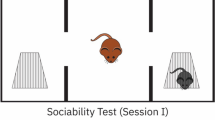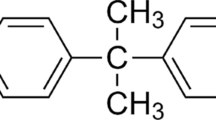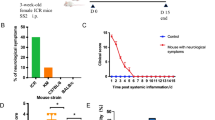Abstract
Recent research on placental, embryo, and brain organoids suggests that the COVID-19 virus may potentially affect embryonic organs, including the brain. Given the established link between SARS-CoV-2 spike protein and neuroinflammation, we sought to investigate the effects of exposure to this protein during pregnancy. We divided pregnant rats into three groups: Group 1 received a 1 ml/kg saline solution, Group 2 received 150 μg/kg adjuvant aluminum hydroxide (AAH), and Group 3 received 40 μg/kg spike protein + 150 μg/kg AAH at 10 and 14 days of gestation. On postnatal day 21 (P21), we randomly separated 60 littermates (10 male–female) into control, AAH-exposed, and spike protein-exposed groups. At P50, we conducted behavioral analyses on these mature animals and performed MR spectroscopy. Subsequently, all animals were sacrificed, and their brains were subject to biochemical and histological analysis. Our findings indicate that male rats exposed to the spike protein displayed a higher rate of impaired performance on behavioral studies, including the three-chamber social test, passive avoidance learning analysis, open field test, rotarod test, and novelty-induced cultivation behavior, indicative of autistic symptoms. Exposure to the spike protein (male) induced gliosis and neuronal cell death in the CA1-CA3 regions of the hippocampus and cerebellum. The spike protein-exposed male rats exhibited significantly greater levels of malondialdehyde (MDA), tumor necrosis factor alpha (TNF-α), interleukin-17 (IL-17), nuclear factor kappa B (NF-κB), and lactate and lower levels of brain-derived neurotrophic factor (BDNF) than the control group. Our study suggests a potential association between prenatal exposure to COVID-19 spike protein and neurodevelopmental problems, such as ASD. These findings highlight the importance of further research into the potential effects of the COVID-19 virus on embryonic and fetal development and the potential long-term consequences for neurodevelopment.
Graphical Abstract








Similar content being viewed by others
Availability of Data and Material
The datasets supporting the conclusions of this article are included within the article and its additional files.
Code Availability
Not applicable.
References
Akira S, Uematsu S, Takeuchi O (2006) Pathogen recognition and innate immunity. Cell 124(4):783–801
American Psychiatric Association (2013) Diagnostic and statistical manual of mental disorders (5th ed.). https://doi.org/10.1176/appi.books.9780890425596
Baig AM, Khaleeq A, Ali U, Syeda H (2020) Evidence of the COVID-19 Virus Targeting the CNS: Tissue Distribution, Host-Virus Interaction, and Proposed Neurotropic Mechanisms. ACS Chem Neurosci 11(7):995–998. https://doi.org/10.1021/acschemneuro.0c00122
Barros LF, Deitmer JW (2010) Glucose and lactate supply to the synapse. Brain Res Rev 63(1–2):149–159. https://doi.org/10.1016/j.brainresrev.2009.10.002. Epub 2009 Oct 22 PMID: 19852965
Bauman MD, Iosif AM, Smith SE et al (2014) Activation of the maternal immune system during pregnancy alters behavioral development of rhesus monkey offspring. Biol Psychiatry 75(11):332–341. https://doi.org/10.1016/j.biopsych.2013.08.011. Epub 2013 Sep 25 PMID: 24074927
Bilbo SD, Schwarz JM (2012) The immune system and developmental programming of brain and behavior. Front Neuroendocrinol 33(3):267–286. https://doi.org/10.1016/j.yfrne.2012.08.006
Bortolotti D, Gentili V, Rizzo S, Schiuma G, Beltrami S, Strazzabosco G, ... Rizzo R (2021) TLR3 and TLR7 RNA sensor activation during SARS-CoV-2 infection. Microorganisms 9(9):1820
Bradford MM (1976) A rapid and sensitive method for the quantitation of microgram quantities of protein utilizing the principle of protein-dye binding. Anal Biochem 72:248–254
Carter RJ, Lione LA, Humby T, Mangiarini L, Mahal A, Bates GP, Dunnett SB (2001) Characterization of progressive motor deficits in mice transgenic for the human Huntington’s disease mutation. J Neurosci 21(24):961–966
Centers for Disease Control and Prevention (2021) Data on COVID-19 during pregnancy: Severity of maternal illness, centers for disease control and prevention
Chauhan A, Gu F, Essa MM, Wegiel J, Kaur K, Brown WT, Chauhan V (2011) Brain region-specific deficit in mitochondrial electron transport chain complexes in children with autism. J Neurochem 117(2):209–220. https://doi.org/10.1111/j.1471-4159.2011.07283.x. Epub 2011 May 18 PMID: 21501183
Chen Y, Cai F, Wu H, Qian Z (2020a) Mitochondrial dysfunction, oxidative stress and neurodegenerative diseases. Protein Cell 11(11):710–721
Chen CY, Chou YC, Hsueh YP (2020b) SARS-CoV-2 D614 and G614 spike variants impair neuronal synapses and exhibit differential fusion ability. BioRxiv 2020–12
Choudhury A, Mukherjee S (2020) In silico studies on the comparative characterization of the interactions of SARS-CoV-2 spike protein with ACE-2 receptor homologs and human TLRs. J Med Virol 92(10):2105–2113
Costa LB, Perez LG, Palmeira VA, Macedo e Cordeiro, T., Ribeiro, V. T., Lanza, K., & Simoes e Silva, A. C. (2020) Insights on SARS-CoV-2 molecular interactions with the renin-angiotensin system. Frontiers in Cell and Developmental Biology 8:559841
Cucinotta D, Vanelli M (2020) WHO Declares COVID-19 a Pandemic. Acta Biomed 91:157–160
Cunha C, Brambilla R, Thomas KL (2010) A simple role for BDNF in learning and memory? Front Mol Neurosci 3:1–14. https://doi.org/10.3389/neuro.02.005.2010
Delorme C, Paccoud O, Kas A, Hesters A, Bombois S, Shambrook P, Bodeau N, Stroebel A, Moulin V, Bouvard MP, Guillermier M, Royer PY, Varoquaux A, Etcharry-Bouyx F, Leboyer M, Houenou J (2020) COVID-19-related neuropsychiatric symptoms in patients with enclosed space confinement. Front Psychiatry 10(11):589225. https://doi.org/10.3389/fpsyt.2020.589225. PMID: 33281720; PMCID: PMC7689795
Dong Y et al (2021) COVID-19: Characteristics, comorbidities and acute outcomes in the Republic of Ireland and Northern Ireland. PLoS ONE 16(2):e0247135
ELBeltagy M, Mustafa S, Umka J, Lyons L, Salman A, Chur-yoe GT, ... Bhalla P (2010) Fluoxetine improves the memory deficits caused by the chemotherapy agent 5-fluorouracil. Behav Brain Res 208(1):112–117
Ellegood J, Crawley JN (2015) Behavioral and cognitive mouse assays for autism: a survey of reproducibility and validity. Nat Methods 12(7):523–529
Erbas O et al (2018) Neurobehavioral effects of long-term maternal fructose intake in rat offspring. Int J Dev Neurosci 69:68–79
Erbaş O, Solmaz V, Karakilic A, Kaplan S (2013) Effects of the acute and chronic social isolation stress on the morphological and biochemical parameters in the limbic brain structures of rats. Cytotechnology 65(3):387–94. https://doi.org/10.1007/s10616-012-9487-1. Epub 2012 Oct 12. PMID: 23065195; PMCID: PMC3656673
Estes ML, McAllister AK (2015) Immune mediators in the brain and peripheral tissues in autism spectrum disorder. Nat Rev Neurosci 16(8):469–486. https://doi.org/10.1038/nrn3978
Feldmann M, Maini RN, Woody JN, Holgate ST, Winter G, Rowland M, ... Hussell T (2020) Trials of anti-tumour necrosis factor therapy for COVID-19 are urgently needed. Lancet 395(10234):1407–1409
Figueiredo CP et al (2021) SARS-CoV-2-associated cytokine storm during pregnancy as a possible risk factor for neuropsychiatric disorder development in post-pandemic infants. Neuropharmacology 201:108841
Gheblawi M, Wang K, Viveiros A, Nguyen Q, Zhong JC, Turner AJ, ... Oudit GY (2020) Angiotensin-converting enzyme 2: SARS-CoV-2 receptor and regulator of the renin-angiotensin system: celebrating the 20th anniversary of the discovery of ACE2. Circ Res 126(10):1456–1474
Hallmayer J, Cleveland S, Torres A, Phillips J, Cohen B, Torigoe T, Miller J, Fedele A, Collins J, Smith K, Lotspeich L, Croen LA, Ozonoff S, Lajonchere C, Grether JK, Risch N (2011) Genetic heritability and shared environmental factors among twin pairs with autism. Arch Gen Psychiatry 68(11):1095–1102. https://doi.org/10.1001/archgenpsychiatry.2011.76
Hampshire A et al (2021) Cognitive deficits in people who have recovered from COVID-19. E Clin Med 101044
Han J, Criado AE (2021) SARS-CoV-2 spike protein disrupts synapses and induces neural inflammation in rats: Implications for COVID-19-associated neuropathology. Molecular Autism 12(1):50
Heneka MT, Carson MJ, El Khoury J, Landreth GE, Brosseron F, Feinstein DL, ... Kummer MP (2015) Neuroinflammation in Alzheimer’s disease. Lancet Neurol 14(4):388–405
Hsiao EY, McBride SW, Chow J et al (2012) Modeling an autism risk factor in mice leads to permanent immune dysregulation. Proc Natl Acad Sci U S A 109(21):12776–12781. https://doi.org/10.1073/pnas.1202556109. Epub 2012 May 7 PMID: 22566635
Jakhmola S, Indari O, Kaushik S et al (2021) COVID-19: Pathogenesis, cytokine storm and therapeutic potential of interferons. Cytokine Growth Factor Rev 58:46–53. https://doi.org/10.1016/j.cytogfr.2021.02.002
Kebir H et al (2017) Human TH17 lymphocytes promote blood-brain barrier disruption and central nervous system inflammation. Nat Commun 8(1):1–17
Kinnunen T, Kieseppä T, Kiviranta H (2022) SARS-CoV-2 infection and autism spectrum disorder. J Autism Dev Disord 52(1):41–48. https://doi.org/10.1007/s10803-021-05123-y
Klein SL, Flanagan KL (2016) Sex differences in immune responses. Nat Rev Immunol 16(10):626–638
Li F, Li J, Wang PH, Yang N, Huang J, Ou J, ... Zhang Q (2021) SARS-CoV-2 spike promotes inflammation and apoptosis through autophagy by ROS-suppressed PI3K/AKT/mTOR signaling. Biochim Biophys Acta (BBA)-Mol Basis Dis 1867(12):166260
Li X, Chauhan A, Sheikh AM, Patil S, Chauhan V, Li XM, Ji L, Brown T, Malik M (2009) Elevated immune response in the brain of autistic patients. J Neuroimmunol 207(1–2):111–116. https://doi.org/10.1016/j.jneuroim.2008.12.002. Epub 2009 Jan 21 PMID: 19157558
Liddelow SA, Guttenplan KA, Clarke LE, Bennett FC, Bohlen CJ, Schirmer L, ... Barres BA (2017) Neurotoxic reactive astrocytes are induced by activated microglia. Nature 541(7638):481–487
Lins B (2021) Maternal immune activation as a risk factor for psychiatric illness in the context of the SARS-CoV-2 pandemic. Brain Behav Immun Health 16:100297
Lopez-Diaz A et al (2021) COVID-19 infection during pregnancy and risk of neurodevelopmental disorders in offspring: time for collaborative research. Biol Psychiatry 89:e29–e30
Lu R et al (2020) Genomic characterisation and epidemiology of 2019 novel coronavirus: Implications for virus origins and receptor binding. Lancet 395:565–574
Manik M, Singh RK (2022) Role of toll-like receptors in modulation of cytokine storm signaling in SARS-CoV-2-induced COVID-19. J Med Virol 94(3):869–877
Masi A, Glozier N, Dale R, Guastella AJ (2017) The immune system, cytokines, and biomarkers in autism spectrum disorder. Neurosci Bull 33(2):194–204. https://doi.org/10.1007/s12264-017-0100-y. Epub 2017 Mar 20 PMID: 28321847
Matta SM, Hill-Yardin EL, Crack PJ (2019) The influence of neuroinflammation in Autism Spectrum Disorder. Brain Behav Immun 79:75–90
Mauvais-Jarvis F, Bairey Merz N, Barnes PJ, Brinton RD (2020) COVID-19 and sex differences: Mechanisms and biomarkers. Mayo Clin Proc 95(10):2189–2203
Mergenthaler P, Lindauer U, Dienel GA, Meisel A (2013) Sugar for the brain: the role of glucose in physiological and pathological brain function. Trends Neurosci 36(11):587–97. https://doi.org/10.1016/j.tins.2013.07.001. Epub 2013 Aug 20. PMID: 23968683; PMCID: PMC4074855
Moy SS, Nadler JJ, Young NB, Perez A, Holloway LP, Barbaro RP, ... Crawley JN (2004) Mouse behavioral tasks relevant to autism: Phenotypes of 10 inbred strains. Behav Brain Res 153(1):403–410
Munoz L, Ammit AJ (2010) Targeting p38 MAPK pathway for the treatment of Alzheimer’s disease. Neuropharmacology 58(3):561–568. https://doi.org/10.1016/j.neuropharm.2009.11.005
Natarajaseenivasan K, Radhakrishnan N, Hariharan R, Muthusamy R, Madhavan T (2021) Role of nuclear factor-kappaB and its upstream regulators in Alzheimer’s disease. Biomed Pharmacother 137:111309. https://doi.org/10.1016/j.biopha.2021.111309
National Institute of Mental Health. Autism spectrum disorder. Accessed 27 Feb 2023. https://www.nimh.nih.gov/health/topics/autism-spectrum-disorders-asd/index.shtml
Oh J, Cho WH, Barcelon E, Kim KH, Hong J, Lee SJ (2022) SARS-CoV-2 spike protein induces cognitive deficit and anxiety-like behavior in mouse via non-cell autonomous hippocampal neuronal death. Sci Rep 12(1):5496
Okechukwu C (2021) Inflammatory cytokines induced by severe acute respiratory syndrome coronavirus 2 infection during pregnancy may alter fetal brain development predisposing the offspring to neurodevelopmental disorders. Nigerian J Exp Clin Biosci 9:58
Olajide OA, Iwuanyanwu VU, Adegbola OD, Al-Hindawi AA (2022) SARS-CoV-2 spike glycoprotein S1 induces neuroinflammation in BV-2 microglia. Mol Neurobiol 1–14
Onore CE, Careaga M (2019) Inflammatory exposures and brain development: Implications for autism spectrum disorders. Brain Behav Immun 86:30–41. https://doi.org/10.1016/j.bbi.2019.06.012
Onore CE, Schwartzer JJ, Careaga M, Berman RF, Ashwood P (2014) Maternal immune activation leads to activated inflammatory macrophages in offspring. Brain Behav Immun 38:220–226. https://doi.org/10.1016/j.bbi.2013.12.011. Epub 2013 Dec 25 PMID: 24370625
Pantelis C, Jayaram M, Hannan AJ, Wesselingh R, Nithianantharajah J, Wannan CM, ... O’Brien TJ (2021) Neurological, neuropsychiatric and neurodevelopmental complications of COVID-19. Aust N Z J Psychiatry 55(8):750–762
Pardo CA, Eberhart CG (2007) The neurobiology of autism. Brain Pathol 17(4):434–447
Pilotto A, Odolini S, Masciocchi S, Comelli A, Volonghi I, Gazzina S, Nocivelli L, Pezzini A, Focà E, Carifi A, Magni E, Sessa M, Gerevini S, Bonacina S, Benussi A, Alimonti D, Facheris MF, Castelli F (2021) SARS-CoV-2 encephalitis is a cytokine release syndrome: evidences from cerebrospinal fluid analyses. Clin Infect Dis ciab096. https://doi.org/10.1093/cid/ciab096. Epub ahead of print. PMID: 33599689; PMCID: PMC7929082
Rasile M, Lauranzano E, Mirabella F, Matteoli M (2022) Neurological consequences of neurovascular unit and brain vasculature damages: potential risks for pregnancy infections and COVID-19-babies. FEBS J 289(12):3374–3392
Rhea EM et al (2021) The S1 protein of SARS-CoV-2 crosses the blood-brain barrier in mice. Nat Neurosci 24:368–378
Rossi F, Navarro X (2021) Minimal experimental requirements for definition of extracellular vesicles and their functions: a position statement from the International Society for Extracellular Vesicles. J Extracell Vesicles 10(1):e12055. https://doi.org/10.1002/jev2.12055.PMID
Sakurada et al (2020) Neurodevelopmental disorders induced by maternal immune activation: toward a prevention strategy in the era of the COVID-19 pandemic. Psychiatry Int 1:24–26
Siniscalco D, Antonucci N (2022) COVID-19 in autism spectrum disorder: Does neuroinflammation have a role? Brain Sci 12(1):83. https://doi.org/10.3390/brainsci12010083
Song Y, Ding W, Xiao X, Wu J, Zeng Y, Wu C, Wang J, Wang M (2021a) The spike protein of SARS-CoV-2 interacts with autism-associated proteins, implicating Wnt signaling pathway in COVID-19 and autism. Molecular Autism 12(1):39. https://doi.org/10.1186/s13229-021-00446-8
Song E, Zhang C, Israelow B et al (2021b) Neuroinvasion of SARS-CoV-2 in human and mouse brain. J Exp Med 218(3):e20202135. https://doi.org/10.1084/jem.20202135
Shook LL, Sullivan EL, Lo JO, Perlis RH, Edlow AG (2022) COVID-19 in pregnancy: implications for fetal brain development. Trends Mol Med
Stebbing J, Phelan A, Griffin I, Tucker C, Oechsle O, Smith D, Richardson P (2020) COVID-19: combining antiviral and anti-inflammatory treatments. Lancet Infect Dis 20(4):400–402
Steinman G (2020) COVID-19 and autism. Med Hypotheses 142:109797
Sturman O, Germain PL, Bohacek J (2018) Exploratory rearing: a context- and stress-sensitive behavior recorded in the open-field test. Stress 21(5):443–452
Theoharides C (2020) COVID-19 brain inflammation and autism spectrum disorder. J Child Adolesc Psych 3:1–6
Theoharides TC (2021) Ways to address perinatal mast cell activation and focal brain inflammation, including response to SARS-CoV-2, in autism spectrum disorder. J Pers Med 11(9):860
Totura AL, Baric RS (2012) SARS coronavirus pathogenesis: host innate immune responses and viral antagonism of interferon. Curr Opin Virol 2(3):264–275
Tschopp JF, Bochelen D, Pellerin L (2018) Lactate and the Warburg effect in Alzheimer's disease. In Lactate as a Signaling Molecule (pp. 181–193). Springer
van Steensel FJ, Bögels SM, Perrin S (2011) Anxiety disorders in children and adolescents with autistic spectrum disorders: a meta-analysis. Clin Child Fam Psychol Rev 14(3):302–317
Valdespino-Gomez VM, Valdespino-Castillo PM, Valdespino-Castillo E (2022) Neurological and neuropsychiatric implications of COVID-19: A systematic review. Front Neurol 12. https://doi.org/10.3389/fneur.2021.742756
Vargas DL, Nascimbene C, Krishnan C, Zimmerman AW, Pardo CA (2005) Neuroglial activation and neuroinflammation in the brain of patients with autism. Ann Neurol 57(1):67–81. https://doi.org/10.1002/ana.20315
Varma P, Lybrand ZR, Antopia MC, Hsieh J (2021) Novel targets of SARS-CoV-2 spike protein in human fetal brain development suggest early pregnancy vulnerability. Front Neurosci 14:1440
Volkow ND et al (2021) The healthy brain and child development study-shedding light on opioid exposure, COVID-19, and health disparities. JAMA Psychiat 78:471–472
Wadman M (2021) Brain researchers fret over pandemic’s effects. Science 372(6538):14–15. https://doi.org/10.1126/science.372.6538.14
White SW, Oswald D, Ollendick T, Scahill L (2009) Anxiety in children and adolescents with autism spectrum disorders. Clin Psychol Rev 29(3):216–229
Xiong J et al (2020) Impact of COVID-19 pandemic on mental health in the general population: A systematic review. J Affect Disord 277:55–64
Yan CH, Faraji F, Prajapati DP, Ostrander BT, DeConde AS (2020) Self-reported olfactory loss associates with outpatient clinical course in Covid-19. Int Forum Allergy Rhinol 10(7):821–831. https://doi.org/10.1002/alr.22592. Epub 2020 May 28. PMID: 32469165; PMCID: PMC7307983
Zenaro E et al (2017) The role of chemokines in neuroinflammation and neurodegeneration. Cell Mol Life Sci 74(17):3275–3291
Zhang Q, Bastard P, Liu Z, Le Pen J, Moncada-Velez M, Chen J, ... Bolze A (2020) Inborn errors of type I IFN immunity in patients with life-threatening COVID-19. Science 370(6515)
Funding
This research was supported by grants from the Scientific and Technological Research Council of Turkey (TUBITAK) under the project number 120Z305; Istanbul Technical University Scientific Research Projects with codes TGA-2022–43373 and TGA-2022–43955; Health Institutes of Turkey (TUSEB) with the grant number 7162/8972; and the TUBITAK 2211C Program. There was no specific grant received from commercial or non-for-profit sectors.
Author information
Authors and Affiliations
Contributions
MAE and OE: conceived and designed research, formal analysis, wrote the manuscript, edited the text, Conceptualization. MAE, MT, GDD, IHS, BO, IS, EE, YU and OE: Data curation, conducted experiments, wrote the manuscript. All authors read and approved the manuscript.
Corresponding author
Ethics declarations
Ethics Approval
The Animal Ethics Committee of Demiroglu Science University authorized the experimental procedures used in this study (Approval no: 04220903).
Consent to Participate
Not applicable.
Consent for Publication
Not applicable.
Conflict of Interest
The authors declare that they have no conflicts of interest.
Additional information
Publisher's Note
Springer Nature remains neutral with regard to jurisdictional claims in published maps and institutional affiliations.
Rights and permissions
Springer Nature or its licensor (e.g. a society or other partner) holds exclusive rights to this article under a publishing agreement with the author(s) or other rightsholder(s); author self-archiving of the accepted manuscript version of this article is solely governed by the terms of such publishing agreement and applicable law.
About this article
Cite this article
Erdogan, M.A., Turk, M., Doganay, G.D. et al. Prenatal SARS-CoV-2 Spike Protein Exposure Induces Autism-Like Neurobehavioral Changes in Male Neonatal Rats. J Neuroimmune Pharmacol 18, 573–591 (2023). https://doi.org/10.1007/s11481-023-10089-4
Received:
Accepted:
Published:
Issue Date:
DOI: https://doi.org/10.1007/s11481-023-10089-4




